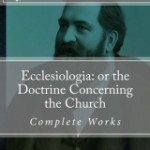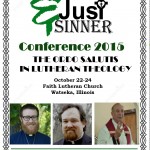Post by Nathan Rinne
In the days of Martin Luther, many persons thought that God was harsh, unforgiving, and cruel. I think it is safe to say that in our day many think that God is indulgent, conviction-less, and, as a result, boring.
I could not help thinking that after I had read Gerald R. McDermott’s new piece on the Witherspoon Institute’s Public Discourse site “A Rather Antinomian Christianity”: John Updike’s Religion.
I will admit to not being all that familiar with John Updike’s work, but Mr. McDermott certainly gives the impression that he is. And his article, as can be seen by the title, expresses some real concerns about the kind of faith Mr. Updike expressed.
He sums this up by saying:
“It was a strange sort of Christianity that rejected the strictures of traditional faith, choosing divine comfort while rejecting divine commands. In other words, it was gospel without law, grace without repentance, the love of God without the holiness of God.”
It is true that as Christians we ought to always be eager to proclaim, highlight, and get to the grace of God in Christ Jesus our Lord. And as I noted in my last post here, the Gospel of the forgiveness of sins, life and salvation in the person of Jesus Christ is perpetually for Christians – all of who fail – and not just unbelievers.
And yet, as a Lutheran who wants to be all about God’s radical grace, I must say that I share McDermott’s concerns. He brings important matters to our attention. For example, McDermott states that Updike’s God helped him, as [his recent biographer] Begley puts it, to “cherish whatever happened to him”, and “His beautifully precise descriptions of desire—and the vague implication that its fulfillment could be religiously justified—reassured readers who feared they might not be justified.”
And then there is this:
In Updike’s religion, then, there are no commandments we are meant to keep except the obligation to accept what is: “Religion includes, as its enemies say, fatalism, an acceptance and consecration of what is.” Our only responsibility is to “appreciate” the great gift that life represents. He learned from Barth that the next life is simply this life in review, and from his Lutheranism, he wrote, “a rather antinomian Christianity”—the idea that there are no laws we should fear or live by—which he was “too timid to discard.” There is no hint of final judgment. Nor is there any imperative to repent or improve ourselves: in Begley’s words, “Original sin may be inescapable, but any concerted effort to improve one’s game resembles a righteous struggle for salvation.” And if there was anything he learned from Barth, it was that all human efforts to save ourselves are wrongheaded and futile. As one critic summed it up, Updike “radically divorced” Christian theology from Christian ethics.
A Google search on some of those passages satisfied my question of whether McDermott has been responsible in how he has quoted Updike – even if a phrase of his own describing Updike, like “so enthusiastic for infidelity” for example, begs to be unpacked and explored.
A few key comments about all of this. First, and most importantly, it seems that Updike was not careful to make clear that while God may indeed use evil for good, we should be careful never to think God planned and meant for us to do such evil – believing such a thing can be fatal to Christian faith. Second, it seems to me that John Updike clearly did have much important truth to share – G.K. Chesterton to, for example, said “every man who knocks on the door of a brothel is looking for God.” Third, as a confessional Lutheran who is troubled by Updike’s own understanding of the Lutheran faith, I nevertheless firmly believe that it is never given to us to pronounce on the final condition of a man’s soul (something McDermott is not doing either, I hasten to add).
Which brings me to a final point, which I take to dovetail with McDermott’s concerns: we need men from the established institution of the church who will challenge our sovereignty of self – whereby we would presume to be our own judge, and administer forgiveness to ourselves. In Holy Confession and Absolution our pastors (please note I am not one of these), as partakers of the Apostolic Ministry, are called to administer in Christ’s name the forgiveness of sins – or not (John 20:23) This is alternatively called binding and loosing (Matthew 16:19).
This requires a judgment on their part of what a person – any person they speak to but particularly to Christians – needs to hear: law or gospel. Perhaps an extended conversation with Mr. Updike – with a humble, strong and wise Christian pastor, for example – may have been necessary to make a good judgment of where he stood… what he believed about the nature of his actions.
Or perhaps not. Perhaps other writings from Updike give us a very good idea of just what he needed to hear. Either something simply like “Do not be deceived: Neither the sexually immoral nor idolaters nor adulterers nor men who have sex with men nor thieves nor the greedy nor drunkards nor slanderers nor swindlers will inherit the kingdom of God”, fullstop (I Cor. 6:9-10), or, on the other hand, something like the rest of that passage: “And that is what some of you were. But you were washed, you were sanctified, you were justified in the name of the Lord Jesus Christ and by the Spirit of our God.” (I Cor. 6:11)
In either case though, it is clear to me that Mr. Updike certainly could have used some good advice – not necessarily literary – on how to proceed in his vocation as a writer who claimed Christ. As a friend wrote in a related context: “The teacher should not try to astound the young with the gravity of his past sins; it will often have the opposite effect than was intended.” I’d say that that should inform how one speaks about one’s own life, and all aspects of one’s vocation in the world as well.
FIN
Updike pic: www.openculture.com












